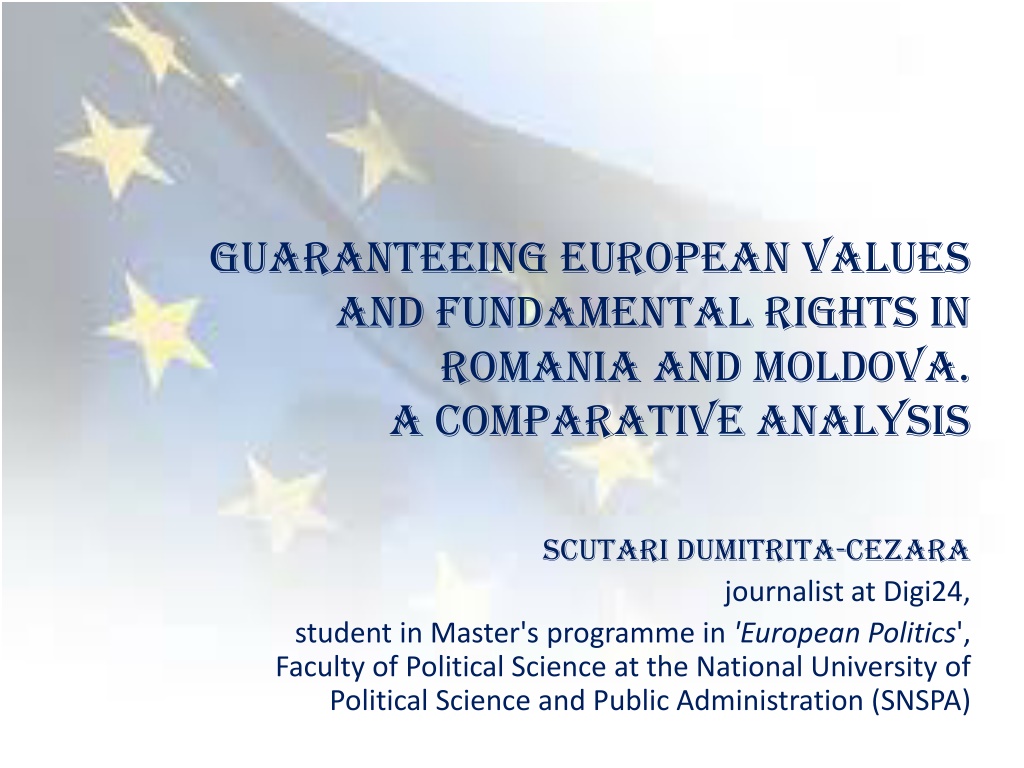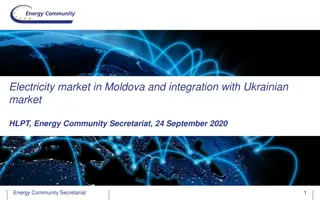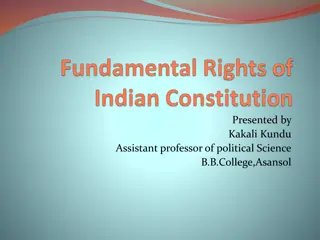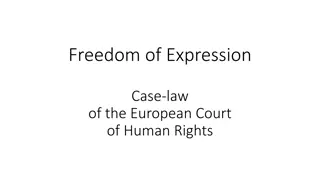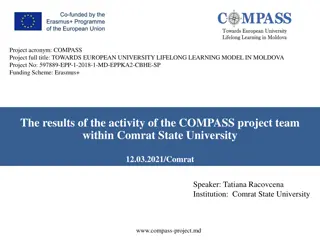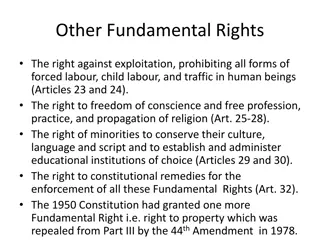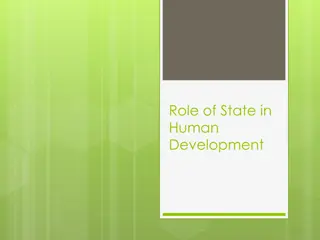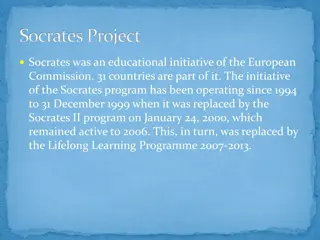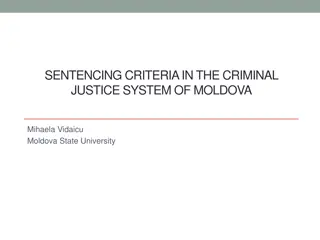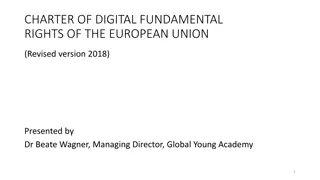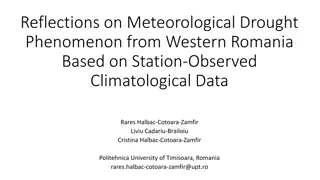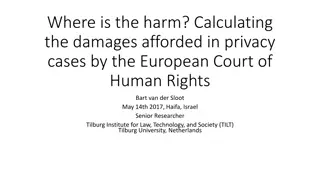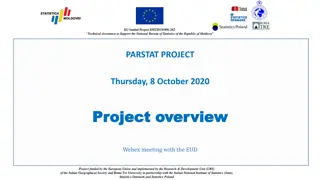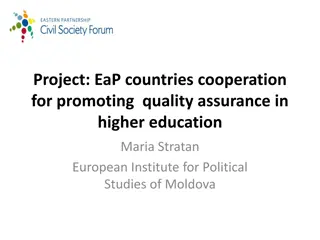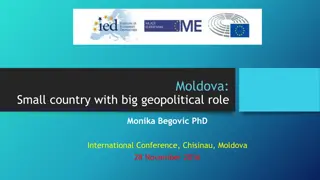Guaranteeing European Values and Fundamental Rights in Romania and Moldova: A Comparative Analysis
This presentation offers a comparative analysis of the political systems in Romania and Moldova, highlighting the deficits that hinder them from fully embracing European values. Romania, as the current President of the Council of the European Union, faces challenges related to democratic deficiencies and corruption, while Moldova is divided between Pro-Russian and Pro-European values, striving towards closer ties with the EU despite internal and external conflicts. The threats to the Romanian justice system further underscore the need for strengthening democratic institutions in both countries.
Download Presentation

Please find below an Image/Link to download the presentation.
The content on the website is provided AS IS for your information and personal use only. It may not be sold, licensed, or shared on other websites without obtaining consent from the author. Download presentation by click this link. If you encounter any issues during the download, it is possible that the publisher has removed the file from their server.
E N D
Presentation Transcript
GUARANTEEING EUROPEAN VALUES AND FUNDAMENTAL RIGHTS IN ROMANIA AND MOLDOVA. A COMPARATIVE ANALYSIS Scutari Dumitrita-Cezara journalist at Digi24, student in Master's programme in 'European Politics', Faculty of Political Science at the National University of Political Science and Public Administration (SNSPA)
INTRODUCTION INTRODUCTION This presentation offers a comparative analysis of the Romania s and Moldova s political systems and aims to interpret the nature of the deficits that prevent them from consolidating the values of the European Union. These deficits are stemming from: ethnic, regional and cultural conflicts; strong and weak features in their general constitutional systems; state capture (including control over the most influential media organizations) by powerful oligarchs and endemic corruption; underdevelopment of political parties and party systems; insufficient trust towards institutions of electoral democracy and a resulting propensity to use extra-constitutional means of political struggle.
Romania the actual president of the Council of the European Union Romania is a free and democratic country. But some senior figures in the Government and Parliament appear to lack democratic instincts. On the top of that, much of the region suffers from inadequate criminal justice and severe corruption. The European Union urged Romania to stick to its commitments to European values as the country officially assumed the rotating presidency of the Council of the EU. The position brings with it heightened scrutiny of the Bucharest government at a time when EU officials and human rights and democracy advocates are raising the alarm over threats to fundamental rights and the rule of law.
Moldova split between Pro-Russian and Pro- European (or Pro-Western) values Moldova joined the EU's Eastern Partnership in 2009 and the EU-Moldova Association Agreement (AA) entered into force in 2016. This includes the introduction of a Deep and Comprehensive Free Trade Area (DCFTA). The AA strengthens Moldova's political and economic ties with the EU. It sets out a reform plan in areas vital for good governance and economic development, and fosters cooperation in several sectors. By signing the agreement, Moldova committed to reforming its domestic policies on the basis of EU laws and practice. To do so, the country benefits from substantial EU support. The Republic of Moldova is at the same time a former Soviet country, caught in internal and external conflicts, powered by geopolitics and with a strong division of society. Different social groups are divided by moral and religious values (such as traditional family or tolerance ), in a strong connection with their geopolitical grounds. Two of the major geopolitical sides are split between Pro-Russian and Pro-European values.
The threats for the Romanian Justice system During January, Justice Minister Tudorel Toader announced that the government was preparing an emergency decree that cancels past corruption convictions against politicians and other elites and curtails or ends existing investigations. The government claimed the decree is being passed to free up space in the country's overcrowded prisons. But it would expunge criminal convictions against numerous elites, giving them not only a clean background but also the legal ability to once again hold public office.
The threats for the Romanian Justice system Despite the scale of corruption in Romania, the country has in recent years made real progress in fighting it. Laura Codruta Kovesi took charge of the National Anticorruption Directorate in 2013 and quickly upped the staff and intensity of its investigations. Hundreds of officials MPs, government ministers, mayors, judges and prosecutors have been brought to justice. The European Commission has even cited Romania s anti-corruption agency as one of the five best in the EU. In February of last year, Justice Minister Toader started a procedure to remove Kovesi, and by July she was gone. This likely contributed to Romania's place on Transparency International's 2018 Corruption Perceptions Index: 25th of 28 EU countries.
Who is responsible in Moldova for the failure of judicial and justice sector reform? All parties who ran Moldova as of 2009 after the CommunistParty share that responsibility. The parties which engaged with the EU did not want to reform areas of governance that have a multiplying effect like justice. Sadly, reforms regarding the justice sector were cosmetic only. The beneficiary is the DemocraticParty , which got the justice sector as it is, afterwards obtained control over the key institutions like the Prosecutor s Office and the Anti- Corruption Centre. It has no incentive to reform the judiciary, because reforms would be to its own disadvantage and damage its prospects of preserving its power.
The failure in the fight against corruption in Moldova The Moldovan government s failure to take prompt action against persons responsible for overseeing banking sector security or who admitted a role in the theft of one billion dollars from the banking sector, discredited the government s corruption. Despite the existence of anticorruption tools, their implementation within the judiciary was deficient. Nonmeritocratic promotion of judges and selective justice applied to political competitors compromised the independence of the judicial system. The term captured state continued to be widely used by local and international experts to define the scope of corruption in the country. stated intention to fight
Moldova, a corrupt country The 2016 Global Corruption Barometer released by Transparency International indicated an increase in perceptions that the influence of the wealthy over government decisions was extremely high. Individual households paid most bribes to workers in the health-care sector, police, and educational institutions. Businesses paid the most bribes in tax offices and in courts.
Discrimination in Romania increased even after joining EU In February 2018, the European Commission stated that the risk of living in poverty was almost three times higher for Roma than for the rest of the population. Rights of LGBT community: the Senate s decision on a national referendum on the possible restriction of the constitutional definition of family from marriage between spouses to marriage between a man and a woman remained pending at the end of the year. The Coalition for Family a group of some 30 associations and foundations has been promoting such restriction since 2016. Living conditions in social care and psychiatric institutions for people with disabilities remained extremely precarious. The monitoring mechanism required by the UN Convention on the Rights of Persons with Disabilities, ratified by Romania in 2011, was not fully operational at the end of the year. In July 2018, the UN Committee on the Elimination of Discrimination against Women recommended broadening existing legislation to address all forms of gender-based violence, strengthening women s access to justice and remedies, disaggregated data collection, and improved access to sexual and reproductive health and rights.
Threats to equality in Moldova A 2016 study prepared by the CPEDEE and the Office of the United Nations High Commissioner for Human Rights (OHCHR), on equality perceptions and attitudesemphasizes that Moldova s population is still prone to intolerance with regard to different vulnerable groups. The most vocal opponents of the laws on equality are The Orthodox Church under the Metropolis of Chisinau and All Moldova (Moldovan Orthodox Church) and the Socialist Party of Moldova (PSRM). On numerous occasions, they criticized the law on ensuring equality and those that support it. While the Orthodox Church uses this rhetoric based on doctrinal reasons, the Socialist Party of Moldova uses it to gain political capital and as one of the main arguments against European integration. The main reason for the frequent violations and threats to equality is the lack of efficient mechanisms and commitment, to implement existing policies and international obligations that Moldova undertook to perform.
Most discriminated in Moldova https://fpc.org.uk/wp-content/uploads/2018/07/Moldova.jpg
The protests have failed to bring real change in Romania In August 2018, 150,000 people took to the streets of Romania to protest against the latest moves by the government to weaken anti- corruption legislation and its increasing authoritarianism. The protests were spearheaded by the Romanian diaspora, many of whom returned home to take part. Such protests and mass mobilisations have grown in recent years either in response to political crises such as the gold mining project at Rosia Montana, the Colectiv Fire, and the country s hospital disinfectant scandal, or to attempts by the governing Social Democratic Party (PSD) to make power-grabs or unpick anti- corruption legislation. Inquam Photos
The protests have failed to bring real change in Romania There is a deep division in Romanian society around social issues and this has been effectively exploited by the PSD and their allies to divide their opponents. The issue of same sex marriage and LGBTI rights is deeply contentious. The PSD and their allies in parliament have aligned themselves with the Orthodox Church in attempting to change the constitution to ban same sex marriage and organize a referendum to this effect. On the other hand, at protests there are often members of the ultras from the local football clubs who tend to be nationalistic, if not racist and intolerant. There are also many ordinary Romanians present at protests who are socially conservative and nationalistic but are simply opposed to corruption. It is therefore relatively easy for the authorities and their supporters in the media to label the protesters as both fascists and as a front for same sex rights. The protesters are divided over the direction of the Romanian economy. While some see corruption as contributing to increasing inequality, others see it as hampering the development of a functioning free market economy. Those who are concerned about inequality are concerned about the anti-corruption protests being captured by neoliberal middle class voices that have no interest in inequality and poverty.
Why the last protests in Moldova didn t succeed For the anti-government protests to succeed critical mass must emerge within society of people willing to overcome political apathy and unite around informal social ties and mutual expectations. Yet in Moldova, society is deeply divided on questions of identity and geopolitics: some favor integration with Russia, others look to the EU, some seek unification with Romania, others oppose it. Moldova s socio-economic situation also plays a role in perpetuating political apathy. Moldovans per capita income on average at some 2.500 euros per year is well under half the Romanian average of 6.700 euros. Rural poverty is endemic. Large-scale poverty and significant emigration are eroding much of Moldova s highly skilled population, leaving behind those who have come to terms with the country s realities and will only take to the streets over severe economic problems. In the absence of a unified opposition, external support, and economic incentives, Moldova s protests are unlikely to succeed. source: Reuters
What is to be done? Romania has benefited immensely from its membership in the European Union. In the ten years since accession, the EU has channelled some 27 billion into Romanian infrastructure, improving people s quality of life and making Romania a more attractive place for foreign investment. Romania has also seen a spectacular increase in its GDP per capita. Romania s presidency of the EU is the perfect moment for the government to leave aside its short-term, self-preserving priorities and think about the longer perspective. The next six months are an opportunity to strengthen Romania s position in the union, if it is willing to take it.
What is to be done? The perpetuated disappointment in the pro-European political parties (2009-2017) and the high poverty level at which many Moldovans live make the European integration and, respectively, the European values, to be associated with something elitist or imaginary, for now inaccessible. With or without the involvement of the Russian-Eurasian factor, the popularization of the European values in Moldova requires time, considerable effort and patience, exactly as in the case of the EU member states, where there is yet opposition to particular facets of the European values. Ultimately, the reanimation of the European course in Moldova, which embodies the European values, necessitates authentic civil society, credible pro-European political alternatives and intelligent external conditionality that would maximally narrow the maneuvering area of the government and would stimulate reforms.
Online Sources: https://www.cer.eu/in-the-press/what-are-european-values https://www.liberties.eu/en/news/corruption-romania-clue-article/16928 https://www.bertelsmann-stiftung.de/en/our-projects/strategies-for-the-eu- neighbourhood/project-news/moldova-giving-in-to-oligarchs-or-fighting-for-fundamental- values-and-democracy/ https://www.amnesty.org/en/countries/europe-and-central-asia/romania/report-romania/ https://fpc.org.uk/the-rise-of-illiberal-civil-society-in-moldova/ https://www.amnesty.org/en/countries/europe-and-central-asia/romania/report-romania/ http://www.equineteurope.org/IMG/pdf/Raport_de_cercetare_CNCD_summary.pdf https://blogs.lse.ac.uk/europpblog/2018/09/19/why-romanias-protests-have-failed-to-bring- about-real-change/ http://theconversation.com/why-romania-is-clashing-with-brussels-at-the-worst-possible- time-109303 http://www.ipn.md/en/integrare-europeana/84125 https://tradingeconomics.com/moldova/corruption-rank https://transparency.hu/en/news/global-corruption-barometer-2016/
